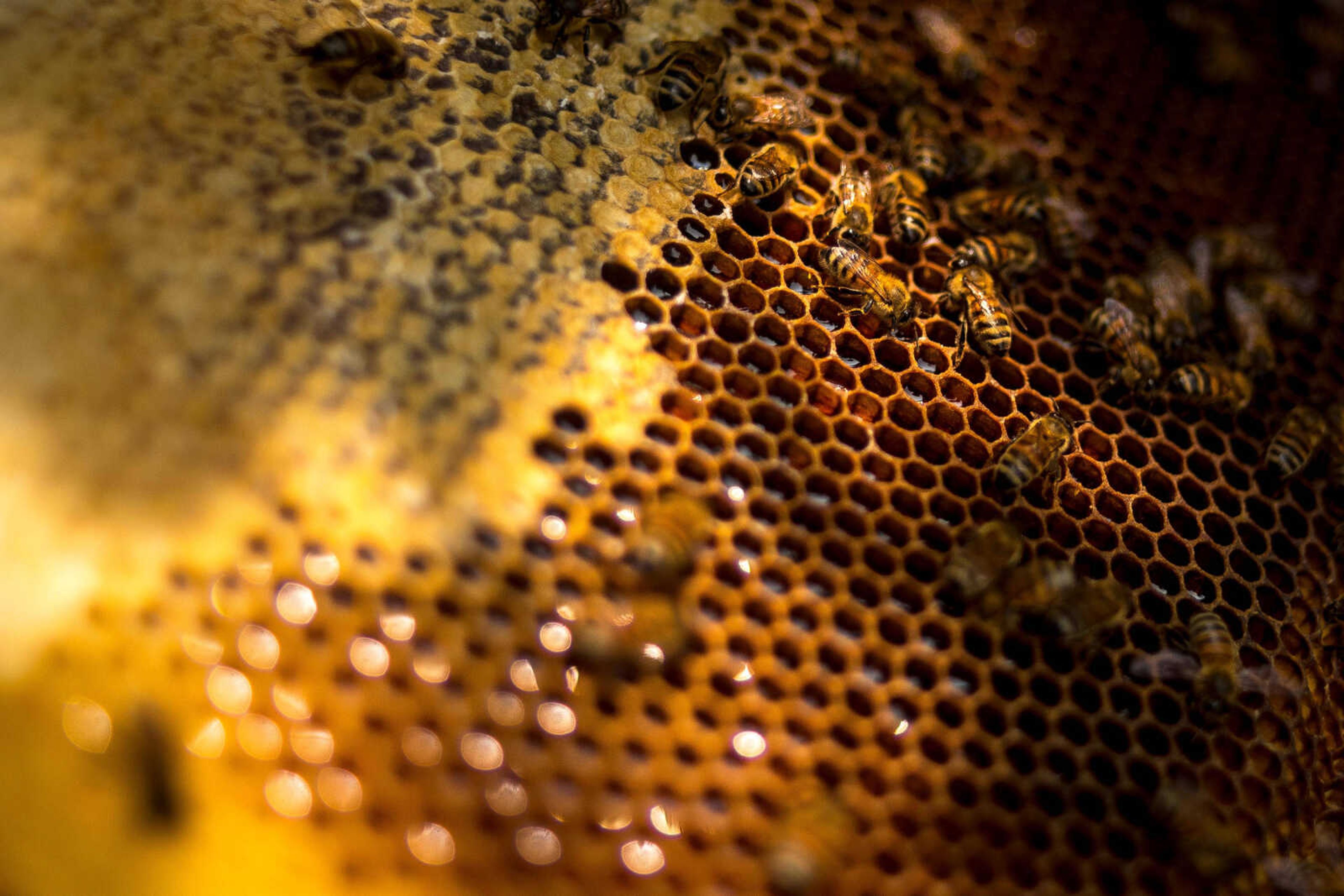For the Love of Honey
Paul Koeper is one of the three commissioners for Cape Girardeau County, and he’s happy to talk about county roads, the construction of a new courthouse and state prisoner reimbursement rates. But you want to see his eyes sparkle, ask him about bees. ...
Paul Koeper is one of the three commissioners for Cape Girardeau County, and he’s happy to talk about county roads, the construction of a new courthouse and state prisoner reimbursement rates. But you want to see his eyes sparkle, ask him about bees. Honeybees. Koeper is one of dozens of people around the area who invest time, effort and money into producing local honey, in the process, helping pollinate the world around their hives, leading to better city gardens and farmland with higher yields. The honey — sweet and pure — he sells largely through Rozier’s grocery store in Perryville, Missouri, under the label “Sauer farms,” which is named for his wife’s family, who helps him, and where many of his hives are located.
When I first heard Koeper talk about bees, I thought his personal story would be an entry point into a business article about the commercial bee industry, which increasingly profits in pollination services. More revenue is earned in the United States renting bees to farmers — especially to almond farmers in the Central Valley of California — than in selling domestic honey. Commercial beekeepers will load semi-trucks with 400 to 450 hives, totaling more than 3 million bees each truck, for long trips west. In 2018, according to Bee Culture magazine, almond farmers alone contracted to use roughly 73 percent of the total U.S. honey bee colony population. At roughly $200 a hive, a semi-truck of bees could rent for $90,000 for roughly six weeks. Beekeepers then add to revenue by moving their bees from almonds to fruit trees during the flowering seasons before bringing them back home. Farmers typically require a minimum of 23 hives for pollination services, so even smaller beekeepers — also called apiarists — can enter into the business.
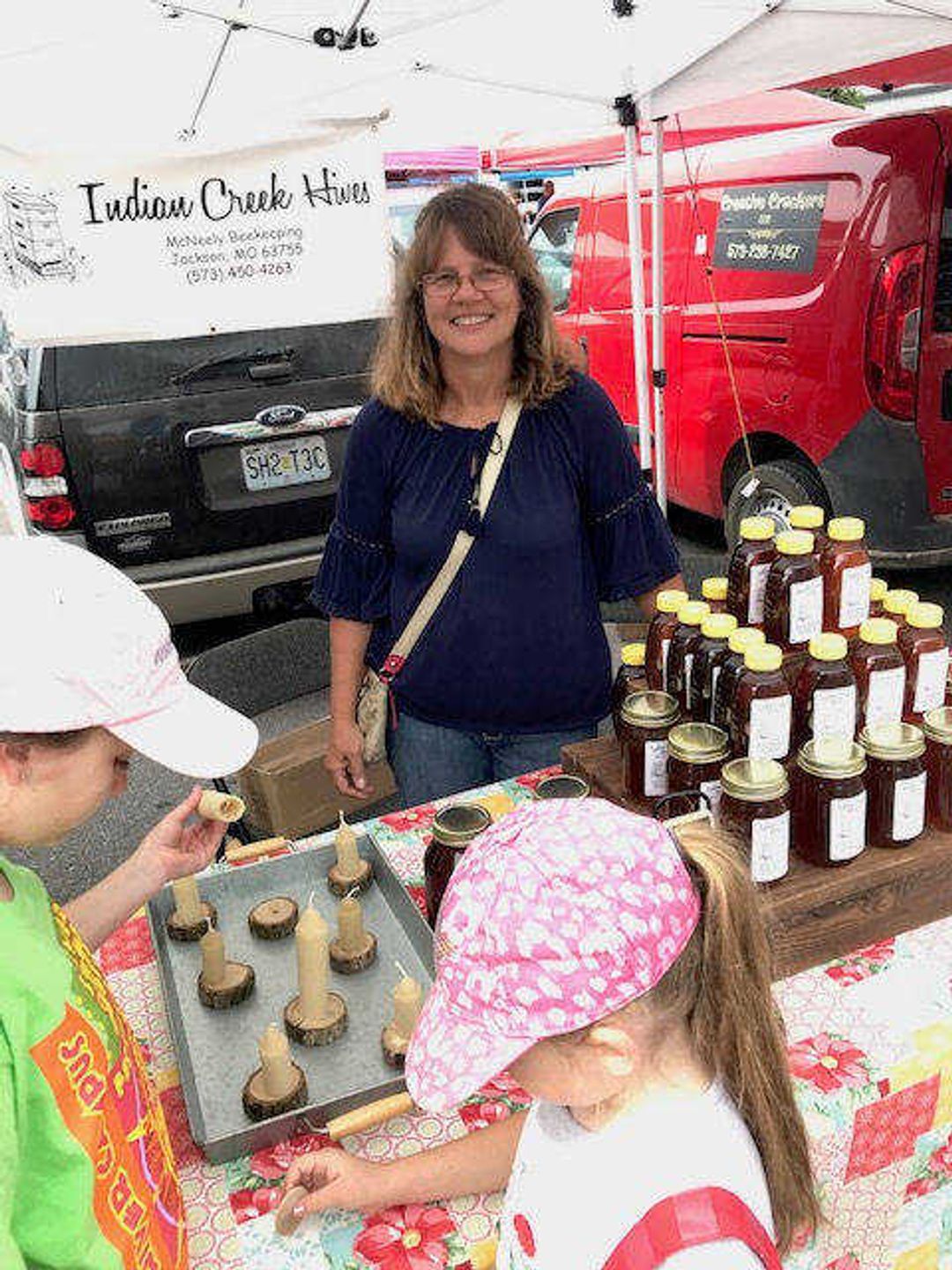
In Southeast Missouri, however, most beekeepers eschew commercial pollination, especially to the West Coast. One reason: It can be tough on the bees, and what I’ve learned in spending time with local apiarists, they love their bees.
In industry parlance, there are three types of beekeepers: hobbyists and commercial on the two ends, and a group called "sideliners" in the middle. A sideline beekeeper is defined as actively seeking income and profit while still having another source of income, like a 9-to-5 job or a pension. When you buy local honey from a vendor at a farmer's market, it's inevitably the product of a sideliner. Indian Creek Hives, which sells its honey at markets in and near Cape Girardeau, is owned and operated by Doug and Carmen McNeely, who started beekeeping to supplement their retirement. Carmen, who is whip smart, has helped diversify their product line from honey into lip balm, hand lotion and beeswax candles.
Asked one Saturday morning at the Cape Riverfront Market how much analysis she and her husband conducted before starting beekeeping, she laughed, "I don't know, maybe we should have thought a little more. It's a lot of work, but we wanted to do something together in retirement, and it's fun. It's also better than sitting around. We've been so busy this year, though, that we didn't go crappie fishing in the spring. Even last night, I was up late making more frames [for the beehives]." The McNeelys now have more than 180 hives, producing 11,000 to 18,000 pounds of surplus honey annually.
For many years the local beekeeping community was led by Grant Gillard, whose main job was pastor at First Presbyterian Church in Jackson. Gillard has written several books about beekeeping and was a regular source for local media. He also helped organize a regional beekeepers group that meets monthly in Jackson. Others knew Gillard because he was the person to call if a sudden swarm of bees would invade a yard. He'd often come out to check on your property -- and help remove the bees when it made sense. He also helped farmers by providing pollination services, but he rarely charged. Instead, he saw it as a mutually beneficial arrangement. Moving his bees around constantly wasn't that interesting to him, because it requires a lot of work late at night or early in the morning when the bees are cozy in their hives, and "I tended to lose things, like pliers, in the dark," he said. But if he could set up hives near different kinds of fruit blossoms, the farmer would see enhanced yield, and he'd produce different varietals of honey -- from sweet and light watermelon blossom honey on one extreme to dark and bold buckwheat on the other. His varieties of honey gave him distinction in the market.
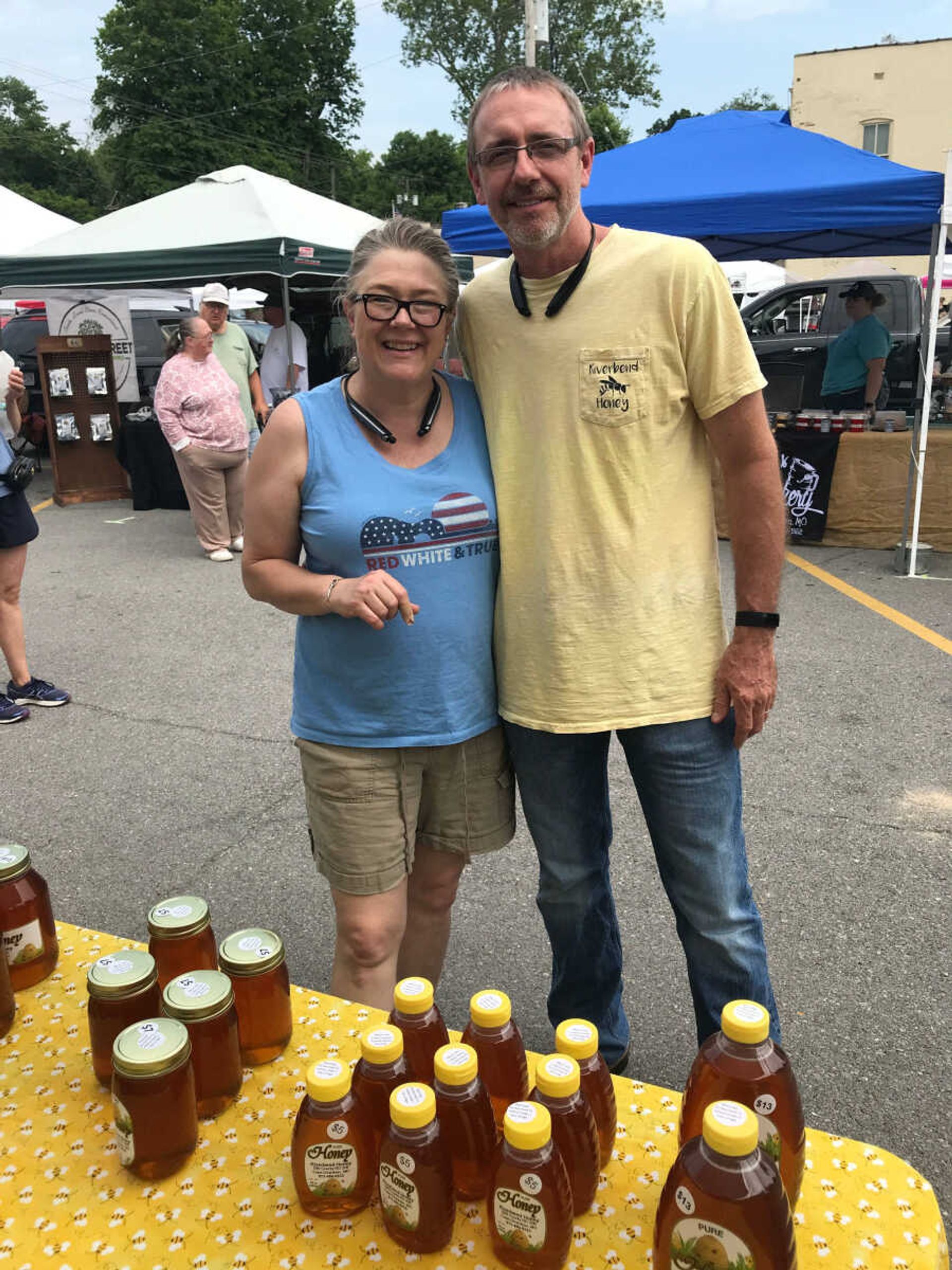
Gillard retired about a year ago and moved to Kansas City to be near children and grandchildren. He still preaches, but it's at a small church that is less demanding on his time. He took his bees with him, too, and his departure freed up demand in the local market for other beekeepers striving to keep pace. The McNeely family has found their honey business booming as a result. Also stepping into the gap is Jeff Mayfield and his family, who long looked at Gillard as a mentor. The Mayfields' label is "Riverbend Honey, 599 County Road 206, Cape Girardeau," and you can often find Jeff and his wife Jamie at local markets, too.
Mayfield picked up a service that Gillard had provided when he was here -- self-serve honey. He keeps an honor container of fresh honey at his place not far from Notre Dame High School for those who want to stop by and serve themselves. Initially, the honor part of the service wasn't always successful, but problems ceased "when I added a game camera," he said.
Similar to the McNeelys, Mayfield entered beekeeping as a family project without a lot of analysis, in part because his late father-in-law Peewee Erlbacher loved honey. "Pee Wee convinced us it could be a good business," Mayfield said. Beekeeping also fit well with Mayfield's main occupation, which is owning and operating "Jeff's Outfitters," an online and catalog business specializing in gun accessories. His online shop has a strong national reputation, and he does business around the world. It's busiest in the winter, though, when the bees largely take care of themselves, and it's quieter in the spring and summer when checking on the hives and extracting honey is more demanding. Having started in 2010 with two hives, Mayfield now has 140 to 150.
"I just fell in love with it," Mayfield said. "Bees are very interesting and amazing at what they can do." Following in the footsteps of Gillard, Mayfield likes to encourage others to try it out, and he is a regular at the club in Jackson, which meets the fourth Tuesday of each month, except in November. He says there are regularly 20 to 30 people at the meetings, and it's a good place not only to find a mentor but to share information about local bee idiosyncrasies.
"There are books you can read about bees, but the bees don't always follow the books," Mayfield said. "At the meetings, we can talk about what we see happening in the hives, new things, different behavior, and others can share notes and help explain. Each year, the bees do something differently."
One hobbyist Mayfield has helped start is Chris Edmonds, owner of the website design firm Element 74. "Chris was eating so much honey, and we were delivering cases to his office on a regular basis, that he decided to give it a try," Mayfield said.
Edmonds is loving it. "This is my first year, so I'm a novice with only two hives. My greatest joy is seeing the miracle of God's creation. It's unbelievable, the incredible harmony of how the bees work together, selflessly, how far they travel. It's just fun."
Edmonds isn't thinking about making money yet. "I'm an empty nester and was looking for a hobby that wasn't too crazy or dangerous," he said. "And I love honey and absolutely believe in its health benefits. It was a natural fit."
Love, amazement, fascination with teamwork, health, the benefits for the larger environment: these are all themes that drew Paul Koeper into beekeeping. The first time I heard the first district commissioner talk about bees was at an Industrial Development Authority dinner where the IDA provides an official financial report to the county. I serve on the IDA board, and my wife and I were talking with him before the dinner started. I don't remember how we got to the subject of bees, but once we did, Koeper lit up, and his enthusiasm was inspiring. He mentioned he had a second bee suit if I wanted to join him some day, and I couldn't resist. How often do you get to put on a bee suit and see what handling a hive is like? Little did I know, he'd put me to work for several hours, checking the "supers" at a few hives; then back at his garage, handling trays, scraping the caps off the honeycombs and placing the frames into the extractor. I loved it!
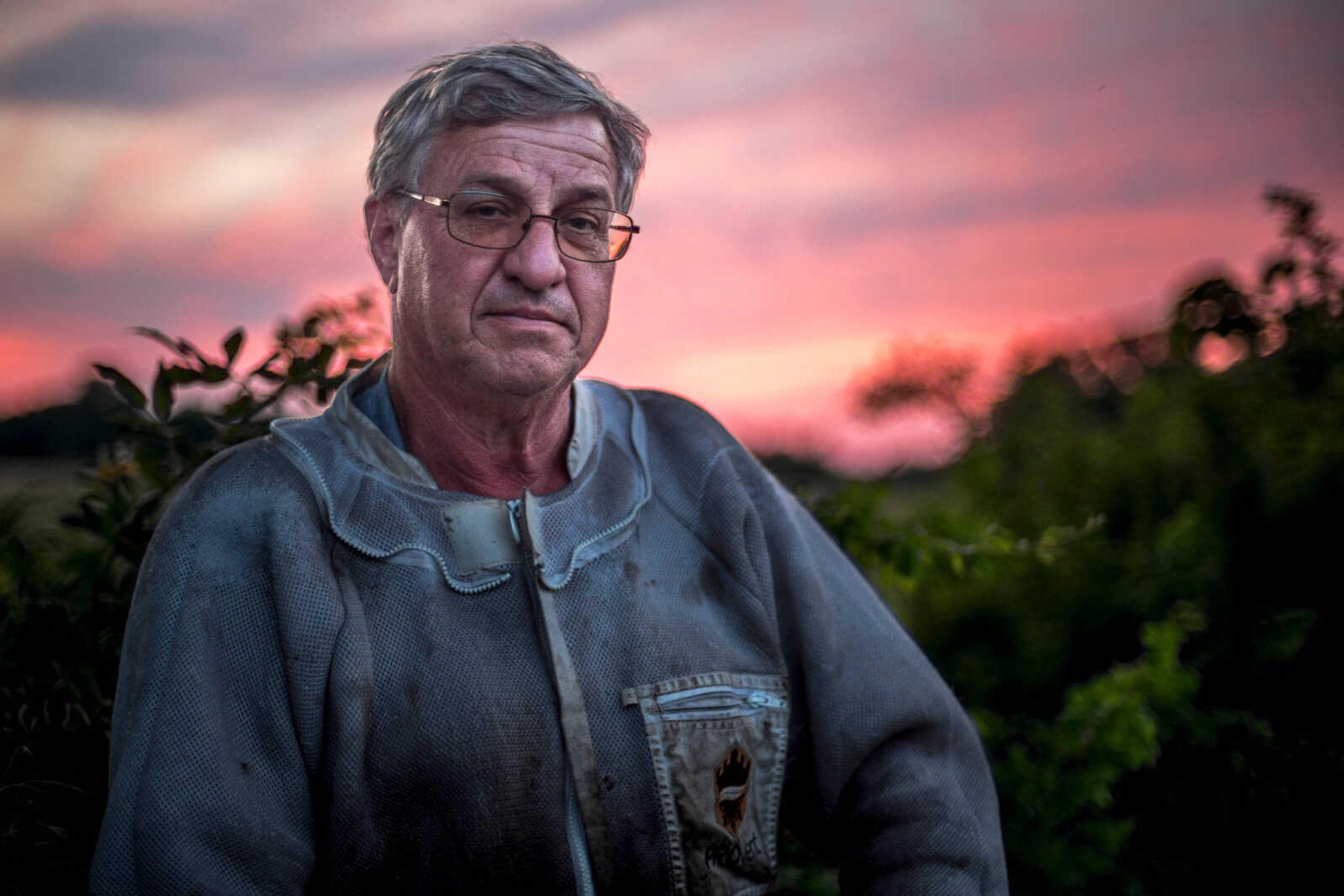
Koeper's background gives him a unique appreciation for bees. A civil engineer by training, he was a project supervisor and then vice president of one of the area's largest construction firms, Penzel Construction Company, where he retired in 2008 after 30 years. Later that year, he was elected to the county commission. He was reelected in 2012 and 2016.
When I arrived at the location of his apiary in Jackson where the bees travel around town drawing pollen and nectar from wildflowers and backyard gardens, Koeper had dozens of laminated pictures of bees with descriptions of their functions ready for me on a table. A tall, affable man with slightly wavy hair, Koeper explained he speaks in front of elementary schools regularly, and the kids are riveted. "Maybe it's because I'm this big guy who brings in items they can see and touch. They're fascinated. I also give them samples of honey to taste." Koeper cites the long recorded history of bees and honey, from stories in the Bible to tales found written in Egyptian hieroglyphics to honey jars buried with pharaohs.
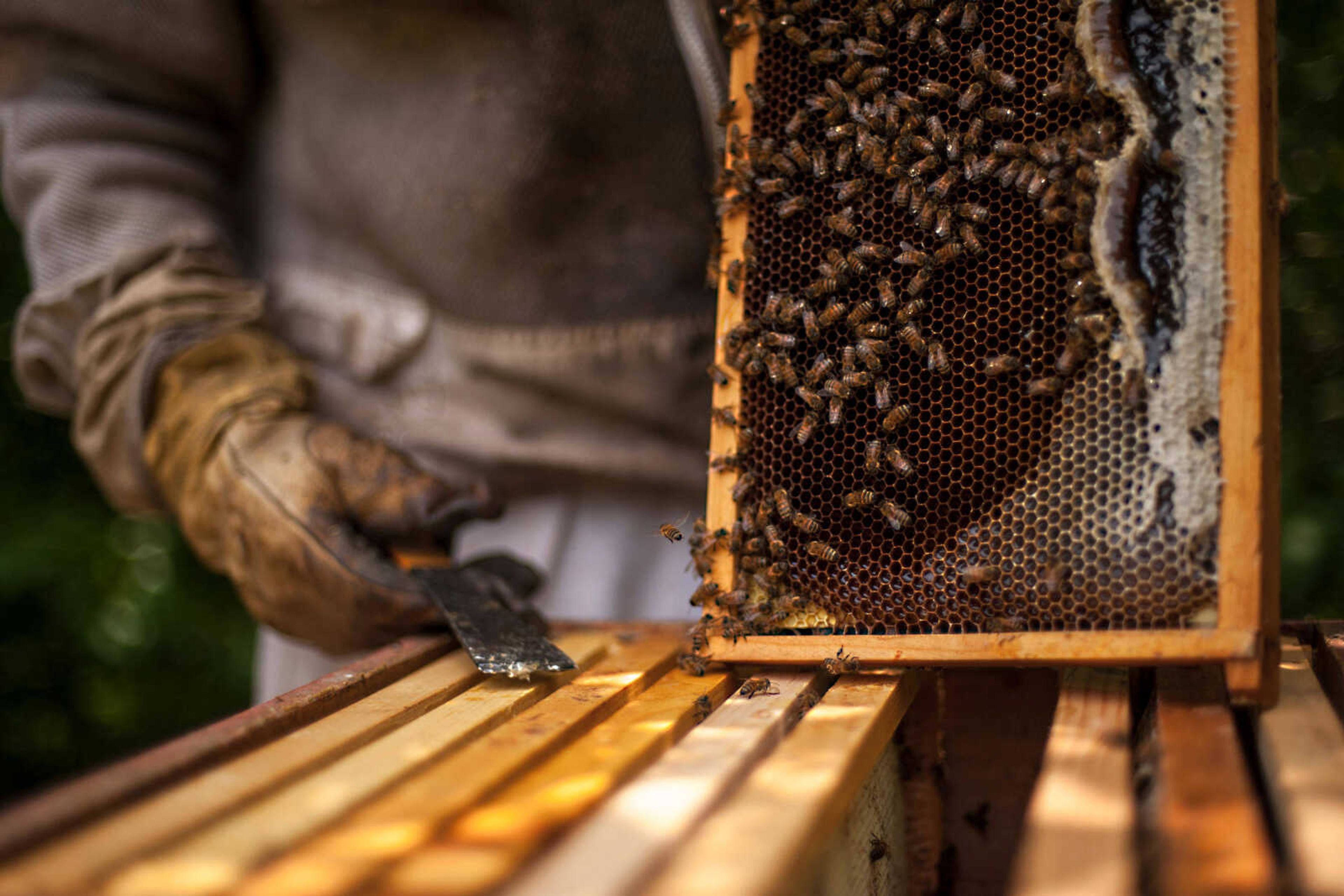
Koeper's teaching underlines the importance of honeybees as pollinators. Two-thirds of all crops grown in the United States rely on bees, some suggest, including Koeper, with crops like blueberries and cherries being 90 percent dependent. Almonds are 100 percent dependent. Without honeybee pollination, crop quality and yields would be greatly reduced. Overall, honeybee pollination is estimated to contribute $20 billion to U.S. crop production annually. But the value is even greater when including the impact on backyard gardens and blossoming trees. An unverified quote attributed to Albert Einstein says, "If the bee disappeared off the face of the Earth, man would only have four years left to live." While not likely true -- there are other natural pollinators like birds, wind, butterflies and bats -- it underlines that bees are vital to the ecology. Raising bees is one way to help and improve the environment, and it's clearly a motivator for Koeper, even if for him and other sideline apiarists, they create a benefit that is rarely recognized and usually taken for granted. But it's the kind of contribution -- selfless, unrecognized teamwork -- that perhaps draws their love to the bees themselves, because to watch and raise bees is to be awed by them.
Koeper, the longtime engineer and construction supervisor, is enthralled by the different roles bees play in the hive. "I love the teamwork most of all," he explains. Bees continuously sacrifice themselves for the health of the hive, especially the female bees who once born never stop working except to sleep a half hour to hour and a half each night, usually in 15- to 30-second catnaps. Female bees, except for the queen bee, are called worker bees, and over the course of their lives, they transition through different roles, starting with using their new wings to help dry honey before moving onto more intricate or complicated tasks.
Koeper has created his own lingo for describing worker bees' jobs. There's the "nursing bees," which feed the developing larvae before closing them into their wax cell for final development. At first, when looking at the hive myself, bundled inside my bee suit, I thought these nurse bees were dead and stuck. But it quickly became clear they were just leaning into each cell with food before moving onto the next.
There are the "housekeepers," whose job is to keep the cells spick and span. Whether it's cleaning after honey is extracted or in preparation of the queen to lay eggs, the housekeepers clean up the hive to be ready for what's next. And if the queen isn't happy with the job they do, she'll let them know to return and do better.
Koeper calls the worker bees that remove the bees that die from old age "funeral home directors." And there are "scouts," who travel away from the hive to locate water and flowers, and who give detailed mapping descriptions to the "foragers" through something called the "waggle dance," a precise communication system that tells other bees exactly where to fly, even miles away.
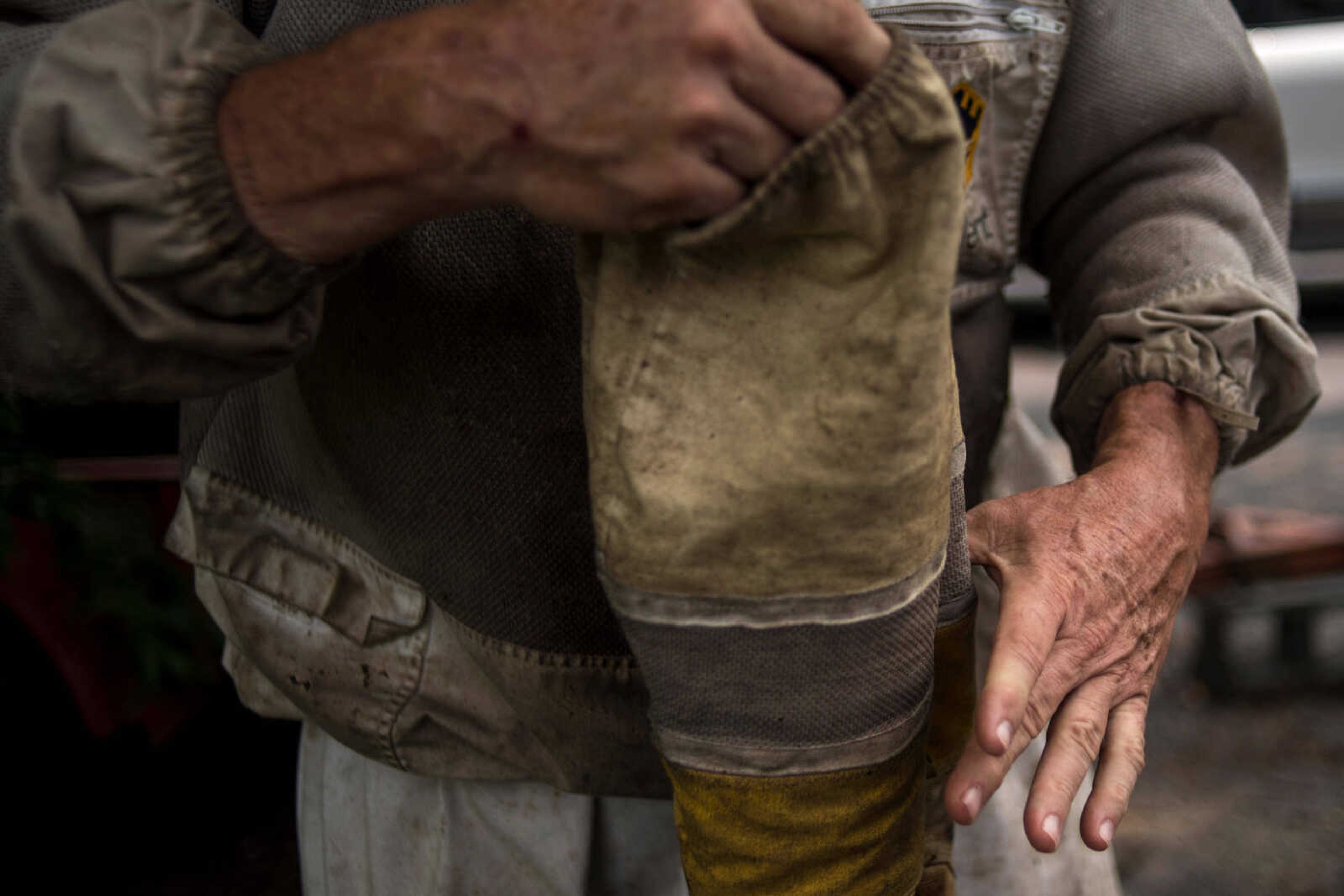
"I've watched them dance, and it's amazing, just like the scientists describe," Koeper said. The foragers follow the directions to bring pollen back on their legs and nectar in a special stomach that doesn't digest it, which they will then pass onto other worker bees back at the hive. The nectar may be passed mouth-to-mouth up to 20 times, each transfer helping to remove moisture, transforming the nectar into honey, when it is finally placed into a wax comb, where it is fanned by young bees to reduce even more of its water concentration and then capped.
The hive is made of boxes: typically two larger "brooding boxes " on the bottom, which Koeper likes to say belong to the colony. Above them he stacks "supers," which are smaller boxes where excess honey is produced that he extracts.
Opening up the boxes and seeing the bees in action was magical. And in a lucky stroke, in one of the hives checked, Koeper quickly identified a queen, which is distinctly larger than the female worker bees. Male bees, called drones, are sized between the queen and worker bees, and have distinctive bubble black eyes. In a hive of 40,000 to 75,000 bees, only up to a couple thousand are drones, and they don't work at all -- except when a virgin queen emerges and needs a mate. If he's one of the 10 to 20 who catches her, though; after his services are used, the drone dies immediately. Those who don't catch her are eventually pushed out of the hive when weather turns cold so food is not wasted on them. More drones will be born later to be ready as needed.
Handling the bees was exciting. But for sideliners, making money relies on extracting and selling honey. Once heavy and full, the "supers," which can weigh 40 to 50 pounds per hivebox when full, are transported to where the extraction will take place. Frames are removed from the box, the wax is uncapped (in my case, with a heated knife or a spiked roller) and the tray is placed into a centrifugal spinner, where the honey is flung out, eventually to flow into a bucket. The honey is filtered several times; then it's ready to eat.
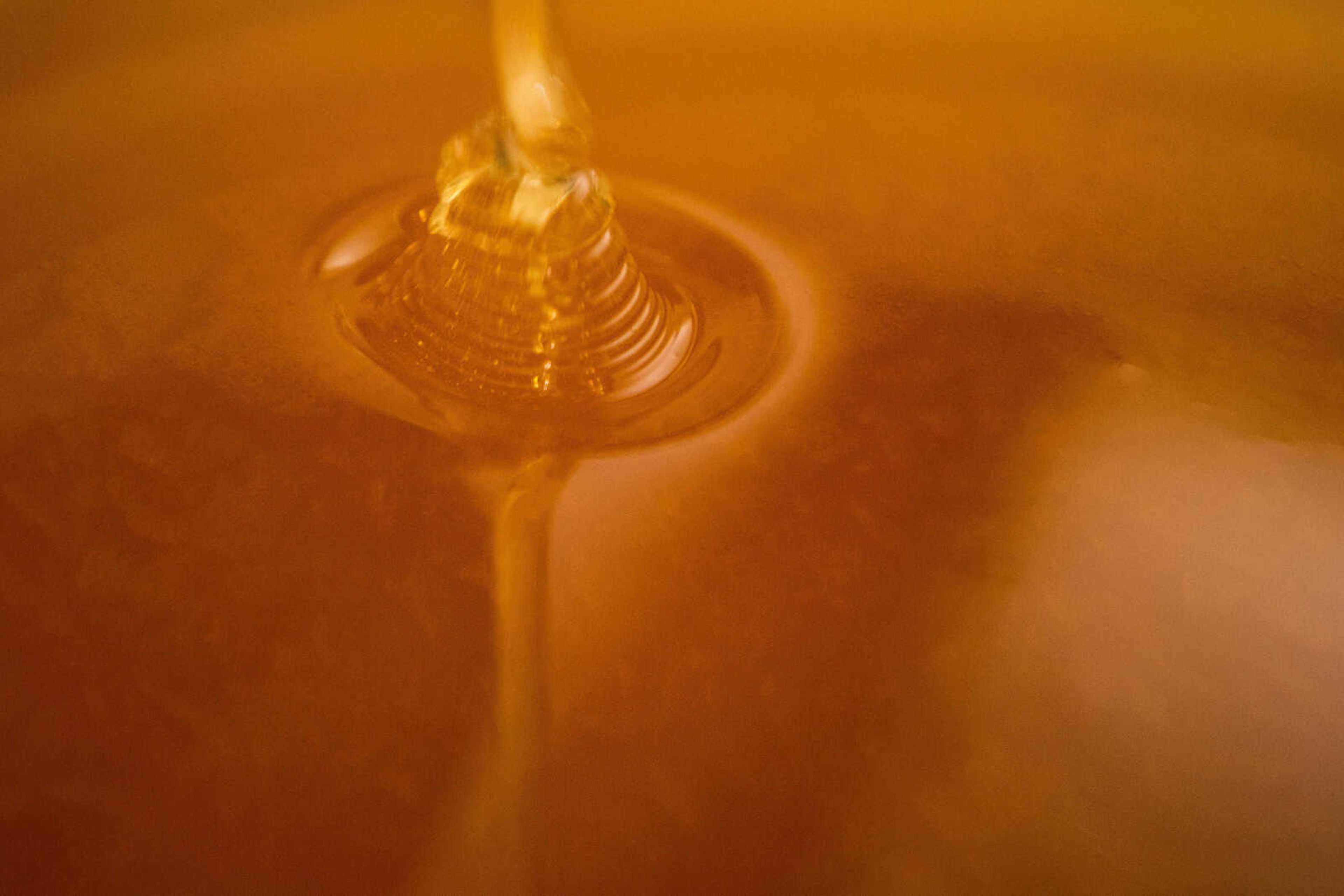
Sweet. Sticky. Delicious.
Koeper wasn't in a hurry to make a profit on his honey. He said that the first three or four years, he lost a bit as he invested in equipment, one-time purchases -- from bee suits to boxes, frames, the extractor -- and bees. Now he has more than 50 hives, which produce 40 to 90 pounds of honey each year. Some bee websites say a target for profit per hive on honey is around $500 per year, but it depends on the demand and price for the sweet stuff. Recently, America has been flooded with honey from producers in places like India, but the origin of the honey isn't clear. Nor is it known if it's been mixed with anything -- for example, watered out -- or what kind of chemicals or pesticides might have been used where the bees foraged. These questions have maintained a steady, growing demand for local, raw honey -- at profitable prices -- where the quality is known, and which have valuable health benefits not contained in imported, pasteurized products whether from across the ocean or from across the country.
Koeper's wife Ellen provided testimony that getting into the honey business actually changed her health. "I used to suffer from five different allergies, but I started taking a spoon of honey each day, and I haven't had the problems I had before." Health science indicates that regularly eating honey produced from local pollen helps inoculate systems to many local allergens.
Next on Koeper's agenda is splitting his hives in the fall through raising his own queen bees, rather than extending or adding hives through queen bee purchases. In fact, Grant Gillard says this particular step is a clear marker for optimizing profitability. Not only does successfully splitting a hive save on needing to buy a queen bee from elsewhere, it can lead to getting into the business of selling queens and new colonies, called Nucs, to others.
For those who think they might want to start themselves, Koeper suggested reading the book "The Beekeeper's Bible" and finding a mentor. Start small, with two hives at the beginning, to make sure it's something you'll love, and to protect yourself from a bad hive by having just one.
Gillard suggested doubling the number of hives at the beginning, as it gives an even better comparison. "Odds are one will be good, one will be not so good, and two will be in the middle." But even before that: 1) Take a class. 2) Find a mentor. 3) Join a bee club.
I enjoyed being a beekeeper's apprentice for a day. Koeper and his wife were delightful, educational hosts, and seeing the bees in action and helping to extract honey was mesmerizing. I also went home with four jars of the most delicious, light, sweet-ambered honey. As Koeper told me, "You don't realize how many friends you have until you start making honey."
For Koeper and other local beekeepers, making honey -- "actually, the bees are the ones making the honey," Koeper laughs -- is much more than a sideline business. It's a passion, a love, a relationship with nature, an environmental service, a family bond, which brings with it many sweet rewards.
---
Honeybee Game of Thrones

If you think the sex, violence and intrigue around "Game of Thrones" queens Daenerys, Cersei, Margaery and Sansa were shocking, wait until you hear the true-life facts about the Mother of Honey, the Queen Bee.
Fed a special diet before she is born -- called royal jelly -- the Queen Bee's first task upon birth is destroying any competitors to the crown. She does this by breaking into their rooms and killing other developing queens with a special stinger, unique to her and without barbs, which allows her to stab repeatedly (in contrast to other female bees, who will die upon a single use of their stinger). If two new queens emerge from their rooms at the exact same time, they fight until the death. Only one will survive. And if there is an old queen still around, she'll kill her, too,
unless beforehand, the old one escapes, taking part of her retinue -- through something called a swarm -- with her.
Next for the queen is picking her suitors, whose only job in life is to eat, drink, be merry and impregnate a virgin queen. In fact, in the Queen Bee's kingdom, that's all that any males -- called drones -- do. They don't work. They don't protect the hive. They don't scout or forage. They have no purpose other than to please the queen.
When the virgin queen takes flight for the first time, hundreds of drones will chase her, the fastest winning her affection. She'll conjoin with up to 20 of them during the flight, each drone falling to his death after impregnating her, appendage ripped from his body after she's done. From the experience, she'll have enough sperm inside her to give birth up to 2,000 times a day for more than two years.
Thus, the life of a drone is to sire hundreds of thousands of progeny after an instance of sex -- then fall to a gruesome death. Or, he can be too slow to succeed in his only appointed task, enjoy a few weeks more of food and cheer in a queen's company, and then be forced out of the hive to die when the weather turns, deemed a drain on the rest of the community, no longer favored by the queen.
The Queen Bee, meanwhile, lays thousands of eggs a day and orders her minions around, including whether the job they're doing cleaning the castle is good enough. But with power also comes risk, for if the queen slows in laying eggs, her minions may divide against her. Some will start feeding royal jelly to other developing females, preparing for a new queen. Others may diminish the food they're feeding her to make her lighter, so that when a new queen emerges, now as the old queen, she can take flight to a new land, taking half the subjects with her and creating a new kingdom elsewhere. That is, unless she kills or is killed by the new, young queen first.
The result of all this sex, violence, power games and intrigue? The creation of a golden substance so sweet and luscious, even the Lannisters would be salivating.
Connect with the Southeast Missourian Newsroom:
For corrections to this story or other insights for the editor, click here. To submit a letter to the editor, click here. To learn about the Southeast Missourian’s AI Policy, click here.

